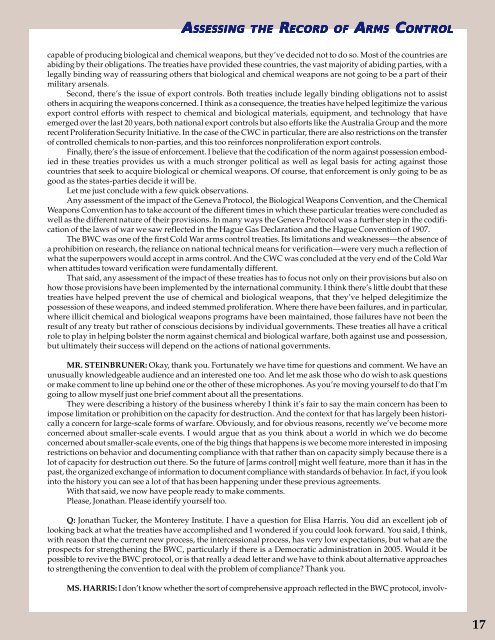test_pdf.pdf
You also want an ePaper? Increase the reach of your titles
YUMPU automatically turns print PDFs into web optimized ePapers that Google loves.
ASSESSING<br />
THE RECORD<br />
OF ARMS<br />
CONTROL<br />
capable of producing biological and chemical weapons, but they’ve decided not to do so. Most of the countries are<br />
abiding by their obligations. The treaties have provided these countries, the vast majority of abiding parties, with a<br />
legally binding way of reassuring others that biological and chemical weapons are not going to be a part of their<br />
military arsenals.<br />
Second, there’s the issue of export controls. Both treaties include legally binding obligations not to assist<br />
others in acquiring the weapons concerned. I think as a consequence, the treaties have helped legitimize the various<br />
export control efforts with respect to chemical and biological materials, equipment, and technology that have<br />
emerged over the last 20 years, both national export controls but also efforts like the Australia Group and the more<br />
recent Proliferation Security Initiative. In the case of the CWC in particular, there are also restrictions on the transfer<br />
of controlled chemicals to non-parties, and this too reinforces nonproliferation export controls.<br />
Finally, there’s the issue of enforcement. I believe that the codification of the norm against possession embodied<br />
in these treaties provides us with a much stronger political as well as legal basis for acting against those<br />
countries that seek to acquire biological or chemical weapons. Of course, that enforcement is only going to be as<br />
good as the states-parties decide it will be.<br />
Let me just conclude with a few quick observations.<br />
Any assessment of the impact of the Geneva Protocol, the Biological Weapons Convention, and the Chemical<br />
Weapons Convention has to take account of the different times in which these particular treaties were concluded as<br />
well as the different nature of their provisions. In many ways the Geneva Protocol was a further step in the codification<br />
of the laws of war we saw reflected in the Hague Gas Declaration and the Hague Convention of 1907.<br />
The BWC was one of the first Cold War arms control treaties. Its limitations and weaknesses—the absence of<br />
a prohibition on research, the reliance on national technical means for verification—were very much a reflection of<br />
what the superpowers would accept in arms control. And the CWC was concluded at the very end of the Cold War<br />
when attitudes toward verification were fundamentally different.<br />
That said, any assessment of the impact of these treaties has to focus not only on their provisions but also on<br />
how those provisions have been implemented by the international community. I think there’s little doubt that these<br />
treaties have helped prevent the use of chemical and biological weapons, that they’ve helped delegitimize the<br />
possession of these weapons, and indeed stemmed proliferation. Where there have been failures, and in particular,<br />
where illicit chemical and biological weapons programs have been maintained, those failures have not been the<br />
result of any treaty but rather of conscious decisions by individual governments. These treaties all have a critical<br />
role to play in helping bolster the norm against chemical and biological warfare, both against use and possession,<br />
but ultimately their success will depend on the actions of national governments.<br />
MR. STEINBRUNER: Okay, thank you. Fortunately we have time for questions and comment. We have an<br />
unusually knowledgeable audience and an interested one too. And let me ask those who do wish to ask questions<br />
or make comment to line up behind one or the other of these microphones. As you’re moving yourself to do that I’m<br />
going to allow myself just one brief comment about all the presentations.<br />
They were describing a history of the business whereby I think it’s fair to say the main concern has been to<br />
impose limitation or prohibition on the capacity for destruction. And the context for that has largely been historically<br />
a concern for large-scale forms of warfare. Obviously, and for obvious reasons, recently we’ve become more<br />
concerned about smaller-scale events. I would argue that as you think about a world in which we do become<br />
concerned about smaller-scale events, one of the big things that happens is we become more interested in imposing<br />
restrictions on behavior and documenting compliance with that rather than on capacity simply because there is a<br />
lot of capacity for destruction out there. So the future of [arms control] might well feature, more than it has in the<br />
past, the organized exchange of information to document compliance with standards of behavior. In fact, if you look<br />
into the history you can see a lot of that has been happening under these previous agreements.<br />
With that said, we now have people ready to make comments.<br />
Please, Jonathan. Please identify yourself too.<br />
Q: Jonathan Tucker, the Monterey Institute. I have a question for Elisa Harris. You did an excellent job of<br />
looking back at what the treaties have accomplished and I wondered if you could look forward. You said, I think,<br />
with reason that the current new process, the intercessional process, has very low expectations, but what are the<br />
prospects for strengthening the BWC, particularly if there is a Democratic administration in 2005. Would it be<br />
possible to revive the BWC protocol, or is that really a dead letter and we have to think about alternative approaches<br />
to strengthening the convention to deal with the problem of compliance? Thank you.<br />
MS. HARRIS: I don’t know whether the sort of comprehensive approach reflected in the BWC protocol, involv-<br />
17<br />
17
















